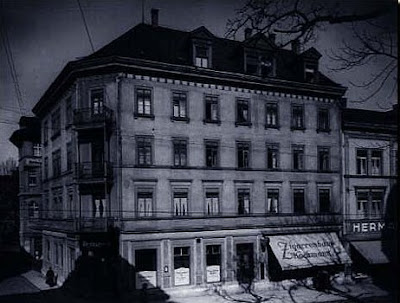 Einstein's father
Einstein's father Einstein's mother
Einstein's mother
School class photograph in Munich , 1889. Einstein is in the front row, second from right. He did well only in mathematics and in Latin (whose logic he admired)
Was Einstein's Brain Different?
Of course it was-people's brains are as different as their faces. In his lifetime many wondered if there was anything especially different in Einstein's. He insisted that on his death his brain be made available for research. When Einstein died in 1955, pathologist Thomas Harvey quickly preserved the brain and made samples and sections. He reported that he could see nothing unusual. The variations were within the range of normal human variations. There the matter rested until 1999. Inspecting samples that Harvey had carefully preserved, Sandra F. Witelson and colleagues discovered that Einstein's brain lacked a particular small wrinkle (the parietal operculum) that most people have. Perhaps in compensation, other regions on each side were a bit enlarged-the inferior parietal lobes. These regions are known to have something to do with visual imagery and mathematical thinking. Thus Einstein was apparently better equipped than most people for a certain type of thinking. Yet others of his day were probably at least as well equipped-Henri Poincar้ and David Hilbert, for example, were formidable visual and mathematical thinkers, both were on the trail of relativity, yet Einstein got far ahead of them. What he did with his brain depended on the nurturing of family and friends, a solid German and Swiss education, and his own bold personality.
A late bloomer: Even at the age of nine Einstein spoke hesitantly, and his parents feared that he was below average intelligence. Did he have a learning or personality disability (such as "Asperger's syndrome," a mild form of autism)? There is not enough historical evidence to say. Probably Albert was simply a thoughtful and somewhat shy child. If he had some difficulties in school, the problem was probably resistance to the authoritarian German teachers, perhaps compounded by the awkward situation of a Jewish boy in a Catholic school.
,+taken+before+the+family+moved+to+Italy.jpg) Albert Einstein in 1893 (age 14), taken before the family moved to Italy
Albert Einstein in 1893 (age 14), taken before the family moved to Italy
 The 'Einsteinhaus' in Berne where Einstein lived with Mileva on the first floor during his Annus Mirabilis
The 'Einsteinhaus' in Berne where Einstein lived with Mileva on the first floor during his Annus Mirabilis Einstein in the Bern patent office
Einstein in the Bern patent office
 Einstein when his light bending theory conformed
Einstein when his light bending theory conformed
 One of the 1919 eclipse photographs taken during Arthur Stanley Eddington's expedition, which confirmed Einstein's predictions of the gravitational bending of light.
One of the 1919 eclipse photographs taken during Arthur Stanley Eddington's expedition, which confirmed Einstein's predictions of the gravitational bending of light.
 Einstein in his study in his home in Berlin, 1919
Einstein in his study in his home in Berlin, 1919
 Einstein in his office
Einstein in his office
 Einstein and Niels Bohr. Photo taken by Paul Ehrenfest during their visit to Leiden in December 1925
Einstein and Niels Bohr. Photo taken by Paul Ehrenfest during their visit to Leiden in December 1925
 Einstein in Berlin with political figures
Einstein in Berlin with political figures
 Einstein, 1921. Age 42
Einstein, 1921. Age 42 Max Planck presents Einstein with the inaugural Max Planck Medal, Berlin June 28, 1929
Max Planck presents Einstein with the inaugural Max Planck Medal, Berlin June 28, 1929
 Einstein in a Berlin synagogue in 1930
Einstein in a Berlin synagogue in 1930
 Einstein and Indian poet and Nobel laureate Rabindranath Tagore during their widely publicized July 14, 1930 conversation
Einstein and Indian poet and Nobel laureate Rabindranath Tagore during their widely publicized July 14, 1930 conversation
 Albert Einstein receiving his certificate of American citizenship from Judge Phillip Forman in 1940
Albert Einstein receiving his certificate of American citizenship from Judge Phillip Forman in 1940
 Albert Einstein in Berlin
Albert Einstein in Berlin Albert Einstein at his home in Princeton, New Jersey
Albert Einstein at his home in Princeton, New Jersey
 Albert Einstein Memorial located on the public grounds of the U.S. National Academy of Sciences, Washington, D.C.
Albert Einstein Memorial located on the public grounds of the U.S. National Academy of Sciences, Washington, D.C.
=====---oOo---=====
To enlarge: Please Click HERE
 POSTWAR SIGNING
POSTWAR SIGNING





No comments:
Post a Comment